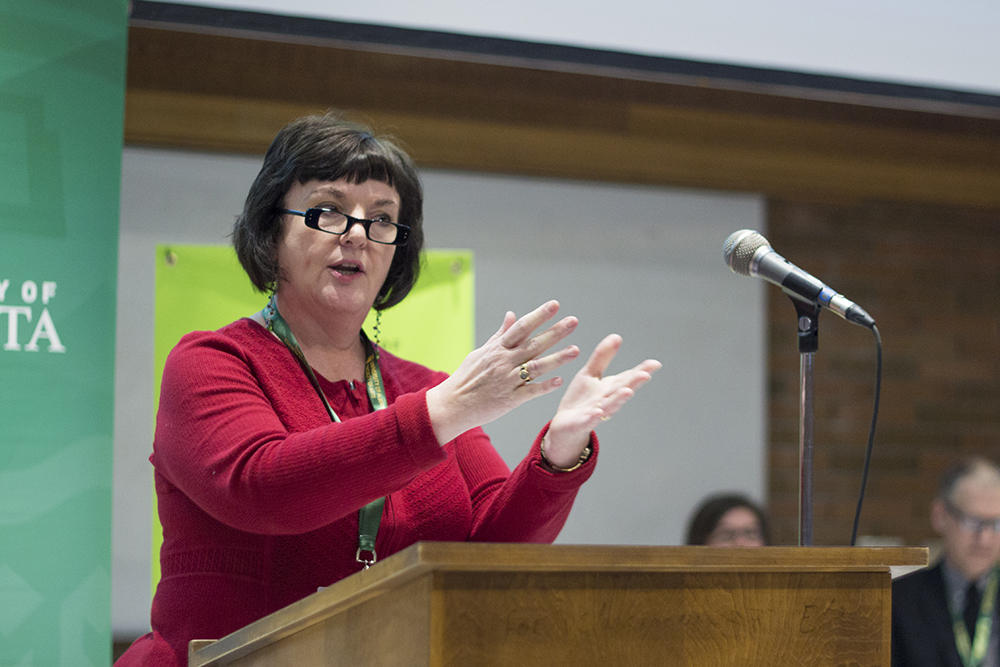
What does it mean to be a human being living in the world today? What do we need in order to thrive in 21st century economy and how do we ensure a better future for Canada and the world? Humanities and social science research is central to answering these important questions. Across the University of Alberta campus, there are researchers from all disciplines working away on an array of projects that tackle major social, cultural, political, technological, economic and environmental issues.
On November 4, in celebration of those talented and innovative humanists and social scientists, the Vice-President (Research) and the Kule Institute for Advanced Study co-hosted Open Minds - a mini-lecture series at the University of Alberta.
A total of nine researchers funded by the Social Sciences and Humanities Research Council of Canada (SSHRC) gave short presentations to showcase the importance and impact of their work. Keavy Martin with the Faculty of Arts presented her SSHRC research project - Reconciliation… Or Treaty Relationships? The Department of English & Film Studies Professor is taking on the very definition of the word "reconciliation" as it impacts Canada's Truth and Reconciliation Commission. "The question is what does 'reconciliation' look like in practice?" says Martin, adding her work identifies some of the pitfalls of current efforts. "One of the problems is the nation's persistent tendency to imagine the residential school system as a discrete event contained safely in the past."
To help overcome these issues, Martin works with Indigenous Artists to identify better ways of engaging the public in understanding the history and ongoing impact of residential schools on Aboriginal peoples across Canada.
Meanwhile, Department of History & Classics professor Sara Komarnisky is using art to commemorate another difficult time in Aboriginal history - when northern Inuit, First Nations and Métis peoples were treated for tuberculosis in southern Canadian hospitals. While in recovery in those hospitals, including Edmonton's own Charles Camsell Hospital, those patients were encouraged to create art and crafts.
"Carvings, paintings, beadwork and sewn goods produced by Indigenous patients tell stories about post-war hospital programs in Canada, practices of collecting, and the lives and family histories of patients during the complex and painful sanatorium era," says Komarnisky. Her research is part of a larger SSHRC-funded partnership grant titled Object Lives and Global Histories in Northern North America: Networks, Localities, and Material Culture c. 1700s-2000s.
But it wasn't just Faculty of Arts professors presenting their social science and humanities research at Open Minds. Among the talented lineup was Alberta School of Business assistant professor Joel Gehman, who studies the impact of social concerns on business, culture and institutions.
John Parkins and Brenda Parlee, with Resource Economics and Environmental Sociology also presented their SSHRC research, along with Reza Hasmath with the Department of Political Science and Educational Psychology masters student Laura Friesen.
SSHRC is a federal research-funding agency that promotes and supports postsecondary-based research and research training in the humanities and social sciences. Susan Hamilton, associate vice-president (research) for UAlberta shared long list of the university's new SSHRC recipients and introduced each speaker.
Hamilton says the event's goal is to show how questions of sociality and relationship are at the heart of our daily lives. "We are always asking, and making decisions about, how we treat each other with respect and dignity, and what we understand a good society to be," she explains. "Social science and humanities researchers are the experts in these matters."
For more information on SSHRC research at UAlberta, visit http://sshrc.ualberta.ca.